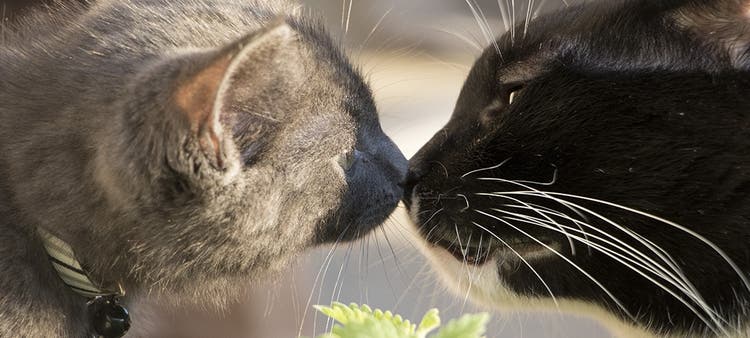Treating and preventing hookworm in cats.
Hookworms are intestinal parasites typically found in the south and southeastern areas of the U.S., especially along the coast. Learn how cats become infected, the signs to watch for and the treatment options available.
How Do Cats Become Infected with Hookworm?
Cats can become infected with hookworms when they come in contact with contaminated soil or feces. Here’s what the typical hookworm life cycle looks like:
- The eggs in infected cats’ droppings hatch into microscopic baby worms, which can survive in soil for months.
- Other cats can either eat these tiny worms (for example, if soil gets onto their paws and they groom themselves), or they can migrate into the cat’s paws directly from the soil before making their way through the cat’s body to the intestine.
- Once inside your cat’s intestines, hookworm larvae mature into adult hookworms and the cycle starts over again.
Cats can also pick up worms by eating rodents or other small mammals that are infected with hookworms. Additionally, kittens are often infected at an early age and are usually dewormed during their first visit to the veterinarian.
What Are the Symptoms of Hookworm in Cats?
The signs of hookworms in cats can vary. If cats carry low numbers of worms, they may not show any signs at all. Higher hookworm numbers can be associated with the following symptoms:
- Anemia (because the worms feed on blood)
- Dark-colored blood in the stool
- Dull coat
- Weight loss
- Difficulty breathing and/or coughing
- Skin irritation around the feet
These signs tend to be more common and more serious in affected kittens than in adult cats.
Treating Cats for Hookworm
If you suspect a hookworm infection in your cat or kitten, take them to a veterinarian. You may be required to bring in a sample of your cat’s stool to confirm a diagnosis; vets can diagnose hookworms by looking for hookworm eggs in cat feces under a microscope.
If your cat has hookworms, your vet will administer a dewormer to kill the adult worms inside your cat; additional treatments may be needed to kill any leftover immature parasites as they mature into adults.
Deworming your cat is an important part of keeping your pet happy and healthy. This is most often achieved with treatments in the form of pills or topicals. Talk with your veterinarian to find the best treatment plan for your cat.

Advantage Multi® for Cats (imidacloprid + moxidectin)
A monthly topical that prevents heartworm disease and treats fleas, roundworms, hookworms and ear mites. Available with a veterinarian's prescription.

Profender® (emodepside /praziquantel) for Cats
Profender® is a single-dose topical solution for the treatment and control of hookworm, roundworm and tapeworm infections in cats and kittens. Available with a veterinarian's prescription.
Profender® Topical Solution (emodepside/praziquantel)
Indications:
PROFENDER Topical Solution is indicated for the treatment and control of hookworm infections caused by Ancylostoma (adults, immature adults, and fourth stage larvae), roundworm infections caused by Toxocara cati (adults and fourth stage larvae), and tapeworm infections caused by Dipylidium caninum (adults) and Taenia taeniaeformis (adults) in cats that are at least 8 weeks of age and weigh at least 2.2 lbs.
Important Safety Information:
CAUTION: Federal (U.S.A.) law restricts Profender® to use by or on the order of a licensed veterinarian. HUMAN WARNING: Children should not contact application site for twenty-four (24) hours while the product is being absorbed. PRECAUTIONS: The effectiveness of this product when used before bathing has not been evaluated. Use with caution in sick or debilitated cats. Oral ingestion or exposure should be avoided.
Advantage Multi® for Cats (imidacloprid + moxidectin)
Indications:
Advantage Multi® for Cats is a once-a-month topical solution for the prevention of heartworm disease, killing adult fleas, the treatment of flea infestations, the treatment and control of ear mite infestations and hookworm, and roundworm infections in cats and kittens 9 weeks of age and older.
Important Safety Information:
CAUTION: Federal law restricts Advantage Multi® for cats to use by or on the order of a licensed veterinarian. WARNINGS: Do not use on sick or debilitated cats or ferrets. Do not use on underweight cats (see ADVERSE REACTIONS). Do not use on cats less than 9 weeks of age or less than 2 lbs. body weight. Do not use on ferrets less than 2 lbs. body weight. PRECAUTIONS: Avoid oral ingestion. HUMAN WARNINGS: Children should not come in contact with the application site for 30 minutes after application.



